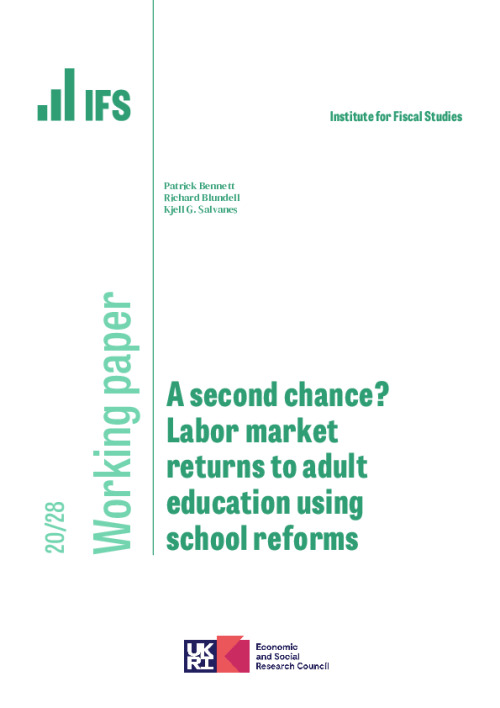Downloads
Roughly one third of a cohort drop out of high school across OECD countries, and developing effective tools to address prime-aged high school dropouts is a key policy question. We leverage high quality Norwegian register data, and for identification we exploit reforms enabling access to high school for adults above the age of 25. The paper finds that considerable increases in high school completion and beyond among women lead to higher earnings, increased employment, and decreased fertility. As male education remains unchanged by the reforms, later life education reduces the pre-existing gender earnings gap by a considerable fraction.
Authors

CPP Co-Director
Richard is Co-Director of the Centre for the Microeconomic Analysis of Public Policy (CPP) and Senior Research Fellow at IFS.

Kjell G. Salvanes

Research Associate University of Liverpool
Lecturer (assistant professor) at the University of Liverpool.
Working Paper details
- DOI
- 10.1920/wp.ifs.2020.2820
- Publisher
- The IFS
Suggested citation
P, Bennett and R, Blundell and K, Salvanes. (2020). A second chance? Labor market returns to adult education using school reforms. London: The IFS. Available at: https://ifs.org.uk/publications/second-chance-labor-market-returns-adult-education-using-school-reforms (accessed: 30 June 2024).
More from IFS
Understand this issue

If you can’t see it, you can’t be it: role models influence female junior doctors’ choice of medical specialty
24 April 2024

Election Special: Is there a 'conspiracy of silence' between both parties?
6 June 2024

What does the Conservative's higher education announcement this week mean for apprenticeships and 'low-value' university courses?
1 June 2024
Policy analysis

How do the last five years measure up on levelling up?
19 June 2024

The uncertain course for school and college funding over the next parliament
19 June 2024

Free breakfast clubs in schools: what Labour’s plans would mean for pupils and families
25 June 2024
Academic research

The impact of labour demand shocks when occupational labour supplies are heterogeneous
28 June 2024

The intergenerational elasticity of earnings: Exploring the mechanisms
3 June 2024

Targeting men, women or both to reduce child marriage
28 May 2024
